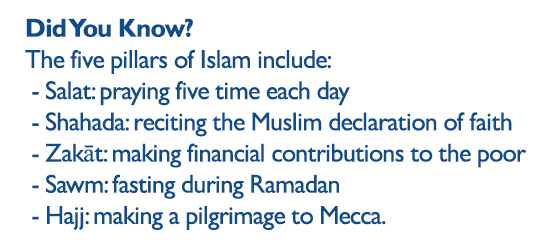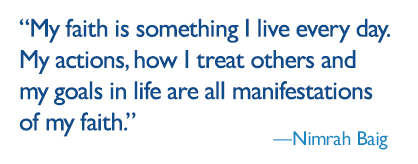“I am Muslim,” says Nimrah Baig, a third-year medical student. Her words do not sound like a label, but rather a bold summation of an entire world that she slowly begins to introduce me to. “My faith is something I live every day. My actions, how I treat others and my goals in life are all manifestations of my faith.”
Baig prays five times a day, whether she is at home or in a busy hospital ward. She carries a foldable prayer rug in the pocket of her white coat and diligently plans around her clinical schedule so that she might be able to step aside briefly in between seeing patients. She thinks of it as a spiritual break. For Baig, praying is a necessity, as important as eating. She finds that praying gives her spiritual rejuvenation and creates an opportunity for team members to ask questions about her faith.
Prayer is merely one of five pillars of Islam. The other pillars include a declaration of Muslim faith, charity, fasting during Ramadan and pilgrimage to Mecca. A common theme in my conversations with other Muslim medical students was how the pursuit of a career in medicine allows them to actively practice sacrifice, generosity and caring for the underserved, all of which are major themes in Islam. “He who saves a life has saved the entirety of humanity” is one of the principles that Omar Najjar, a first-year medical student, strongly believes in. Rather than merely a religion, Najjar sees his relationship with his Islamic faith as all-encompassing. He self-identifies as a Muslim in the form of the culture and lifestyle that it represents.
Awa Sanneh, a third-year medical student, expresses her faith outwardly by wearing a hijab, or headscarf. She began wearing the hijab after undergoing a spiritual transformation during her high school years and has been on a “journey of self-refinement” ever since. There is a heavy sense of responsibility for Sanneh in wearing the hijab.
 “By wearing the hijab, people see me as a representative of Islam,” she shares. Sanneh is also fully aware of the pressures of the current sociopolitical context in America, which have compelled local advocates, such as Adnan Hyder, a Bloomberg School of Public Health professor, to found the American Muslim Wellness Initiative at Johns Hopkins. She is thus even more intimately aware of the importance of being involved with the Muslim-American community, whether it is through attending faith-based events or pursuing her interest in Muslim-American health.
“By wearing the hijab, people see me as a representative of Islam,” she shares. Sanneh is also fully aware of the pressures of the current sociopolitical context in America, which have compelled local advocates, such as Adnan Hyder, a Bloomberg School of Public Health professor, to found the American Muslim Wellness Initiative at Johns Hopkins. She is thus even more intimately aware of the importance of being involved with the Muslim-American community, whether it is through attending faith-based events or pursuing her interest in Muslim-American health.
Through her scholarly research project, Sanneh discovered that Muslim communities in the United States are experiencing health care disparities, likely due to discrimination and a delay in seeking care. For Sanneh, her faith has thus become an essential part of how she sees herself serving her future patients and health care in America. She hopes that in the future, she can address these disparities and be an advocate for patients of her faith and heritage.
About this series:
Although medicine is often seen as a field that is distinct from religion, religious beliefs have a significant impact on the way physicians and medical students approach their training, interactions with patients, and understandings of disease and death. My fellow Biomedical Odyssey blogger Rabia Karani and I have created a short blog series on faith and medicine to give you a glimpse into the worlds of Johns Hopkins students who have been influenced strongly by and/or are actively practicing their faiths.
We hope that you come away with a deeper understanding of the profound impact and immense strength that arises when peoples of faith seek to do good work in the medical field with all their hearts, minds and souls.
Related Content
- Learn more about spiritual services available through The Johns Hopkins Hospital.
- Visit our Office of Diversity and Cultural Competence to learn about overcoming unconscious bias and more.
- Learn more about the Johns Hopkins Graduate Muslim Students Association.

Thank you for this article. Hopefully it will educate and inform people who have an incorrect stereotype of the Muslim religion.
Comments are closed.